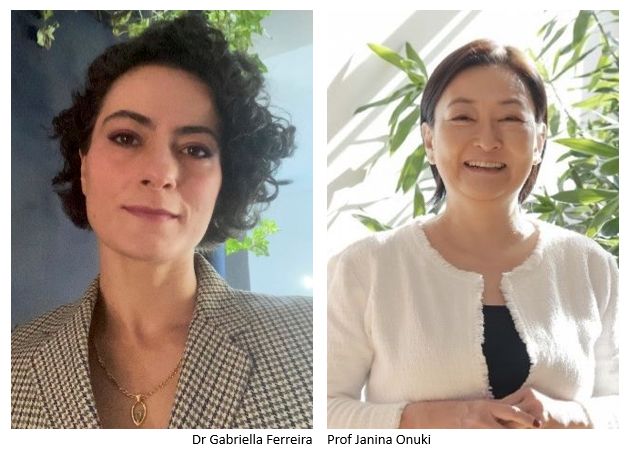
Innovation Diplomacy and Policy Engagement Events (30-31 January 2024)
We are excited to welcome Prof Janina Onuki and Dr Gabriela Ferreira from the University of São Paulo, Brazil, who will be joining us for a pair of events focused on ‘Innovation Diplomacy’ and academic policy engagement related to science, technology, medicine and humanitarian intervention.
Public Symposium by Dr. Gabriella Ferreira and Professor Janina Onuki, Political Science Department, FFLCH, University of São Paulo
30 January 2024, 3:00-5:00pm, Simon 2.57
In this symposium showcasing the research of scholars at University of São Paulo on the relationship between diplomacy and science, technology and medicine, Dr Gabriela Ferreira (with supplementary comments by Professor Onuki) will be providing an introductory lecture on the ‘Innovation Diplomacy’ model and its development.
‘Innovation diplomacy from a Global South perspective: an overview on power struggles’
Science and Innovation Diplomacy (S&ID) can provide conceptual and pragmatic tools that have power to contribute to the development of global policies, by providing policies with scientific input. Therefore, S&ID can enhance the scope of epistemic debates and of science communication, by considering the diversity of both cultural contexts and stakeholders, as well as the latter’s power capacities and objectives. It can also influence regulatory frameworks – and the financial incentives derived from them – that define policy actors and actions, such as those related to EDI or the development of open research information systems. This presentation aims at discussing a Global South S&ID with regard to power in the international arena.
Speakers
Gabriela Ferreira, Post-doctoral fellow, Political Science Department, FFLCH, USP
Gabriela is a FAPESP post-doctoral researcher at the Department of Political Science-USP. She holds a PhD in International Relations from the Institute of International Relations at the University of São Paulo and King’s College London (Joint Degree). She is a researcher at the Center for International Negotiations Studies (NAP—CAENI/USP). She has experience in International Relations with an emphasis on Education, Science, Technology and Innovation.
Janina Onuki, Full Professor, Political Science Department, FFLCH, USP
Janina is currently the coordinator of the International Relations research area of the Latin American Political Science Association (ALACIP and a Full Professor at the Department of Political Science). She is also a researcher at the Center for the Study of International Negotiations and coordinator of the USP Electoral Observatory of the Americas. She was Director of the International Relations Institute from 2018-2021. Graduated in Social Sciences, and doctorate in Political Science at USP, post-doctorate at North Carolina State University (NCSU, 2013). She was editor of the Brazilian Political Science Review (2012-2016), visiting researcher at the Center for Latin American Studies at Georgetown University, and at the Universidad Autónoma de Madrid. She is also the coordinator of the FAPESP thematic project GENDER STI.
The Innovation Diplomacy Symposium is open to all members of the University of Manchester community and the general public.
Doctoral and Early Career Policy Engagement Workshop
31 January 2024, 9:15-11:15am, Simon 2.57
What does ‘policy engagement’ mean? What are the different ways in which we, as academics, can contribute to policymaking and policy dialogue with various stakeholders, such as government, international organisations, non-governmental organisations, and advocacy groups? This event is open to any doctoral students or early career researchers (broadly defined) at the University of Manchester.
In this morning workshop, we will consider the relationship between our work as academics and the variety of ways in which that can potentially be relevant to policymaking, as well as how we as researchers can engage with policymakers through everything from consultation to collaboration. In order to do so, this session will involve a panel discussion and Q&A session in which a mixture of early career and established academics will share their own perspectives on and experiences of policy engagement, as well as provide practical information about opportunities and resources available for researchers at Manchester. In doing so, it aims to provide an introduction to academic policy engagement, particularly for those involved humanities and social sciences research related to science, and technology, medicine and health-related issues.
Policy@Manchester Opportunities:
Beth Warke from Policy@Manchester will provide an introduction to and answer your questions about UoM’s dedicated policy engagement institute. She will explain how Policy@ operates, give us some examples of policy levers they can help Manchester researchers to access, and provide further information about its training portal and resources.
Panel Discussion:
We will be joined by a panel of researchers from the University of Manchester to discuss research and policy engagement. Made up of scholars from a range of disciplinary backgrounds within the humanities and social sciences whose research explores issues related to science, technology, medicine, and health, the panellists will tell us a bit about their own experience of what it means to undertake ‘policy engagement’. They will also provide advice and answer questions about various ways in which early career scholars can consider the policy relevance of their own research and expertise and issues worth considering when pursuing such engagement.
Prof Janina Onuki and Dr Gabriela Ferreira (Political Science Department, FFLCH, University of São Paulo) will be joined by a group of UoM researchers, including:
- Prof. Bertrand Taithe (Director of Research, Humanitarian and Conflict Response Institute)
- Dr. Kristina Tschunkert (HCRI)
- Dr. Janelle Winters (HCRI)
- Dr. Gordon Barrett (Centre for the History of Science, Technology and Medicine)
Please do join us for one or both of the events by signing up via the registration form here: https://forms.office.com/e/YhxHzru3az [forms.office.com]
These events are co-hosted by the Centre for the History of Science Technology and Medicine (https://www.chstm.manchester.ac.uk/) and the Humanitarian and Conflict Response Institute (https://www.hcri.manchester.ac.uk/). They are being held as part of the ‘Gender, Identities and Science Diplomacy of Global North and South’ project, funded by FAPESP and University of Manchester (SPRINT Grant ##2023/00620-0).






0 Comments